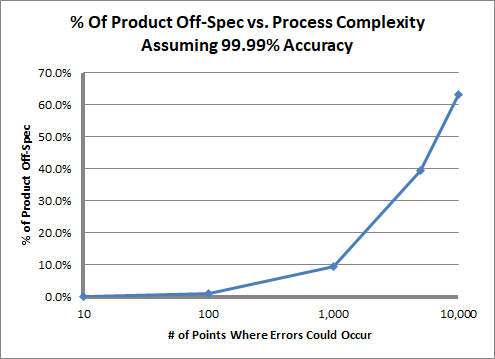Why Validate?
 Stephen Hawking said, “The greatest enemy of knowledge is not ignorance. It is the illusion of knowledge.”
Stephen Hawking said, “The greatest enemy of knowledge is not ignorance. It is the illusion of knowledge.”
Was he talking about process validation? Probably not, but he could have been. I don’t know how often I’ve been told, “We know this process works. We’ve been making this product for decades.”
The company may have done a perfunctory validation when the product was first developed. But at some point it becomes necessary for the company to run a real validation on the process as it is currently run. They write a compliant protocol. They build up inventory of the product in preparation.
Then they run their three conformance batches and disaster strikes. On the first batch there’s an OOS on a minor in-process specification. On the second batch a procedural deviation turns up. Nobody has ever seen this kind of deviation before. But on the other hand nobody has ever supervised this product as closely as these conformance batches.
With enough gall and regulatory creativity these kinds of deviations might be explained, if the third batch came out perfectly. Alas, it’s not to be. The third batch has a big, fat OOS in the API potency. There’s no way this deviation can be explained away.
Now the company has to come face to face with the fact that they don’t understand how to make that product. They don’t now, and they never did. All the time that they’ve been making that product they’ve had off specification results and scrap.
Had the company really understood the manufacturing process for that product, they could have avoided large costs over the lifetime of the product; not to mention the regulatory risks.
One reason that people resist performing validations is that they don’t understand how reliable the individual components of a process need to be in order to be reasonably sure that the product can be made reliably and consistently.
Think about how many things have to go right before a batch of product can be released. Think of all the individual pieces of equipment, instruments, analyses, procedures, raw materials, etc., that have to go perfectly, otherwise the product cannot be shipped. If any one of these items fails, the batch is out of specification.
Even if each individual item is highly reliable, when the ability of the process to produce an on-specification batch is dependent on ALL the parts of the process working perfectly, it’s amazing how unreliable a manufacturing process gets when it has even the slightest amount of complexity.
 Let’s do a little thought experiment here. If you assume that every item in a manufacturing process is 99.99% reliable, and you also assume that a manufacturing process has 10,000 individual components that have to work correctly, then the process will produce off-spec batches more than 60% of the time.
Let’s do a little thought experiment here. If you assume that every item in a manufacturing process is 99.99% reliable, and you also assume that a manufacturing process has 10,000 individual components that have to work correctly, then the process will produce off-spec batches more than 60% of the time.
If you’re reading this blog, you’re fully capable of checking my math. See the graph shown here to see how fast process reliability falls off as process complexity increases

Add new comment